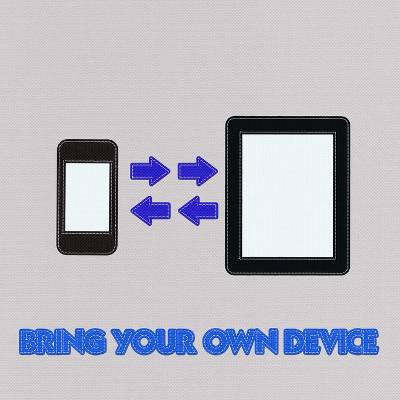Did you know that, according to Gartner, a whole 80 percent of all employees bring their personal mobile devices to the office? It’s a rather troubling development for business owners who want to secure their data and keep their employees productive. However, this Bring Your Own Device (BYOD) trend has proved extremely beneficial for prepared organizations. This must prompt the question of how your business manages mobile devices in the workplace.
The usual response to mobile devices appearing in offices is either the employer supplying company devices, or preventing their use altogether. Unfortunately, neither of these are all positive, so it’s best to approach the situation with an informed and open mind. What follows are the circumstances that come with each approach.
Company-Provided Mobile Devices
Depending on the kind of work your organization does, providing company devices might be beneficial for employees. However, you’ll need to consider all of the finer details, including which platform the devices run on (iOS, Android, Windows), contract terms, and how your organization plans on controlling and protecting data located on the devices. Creating a policy that clearly outlines how work and personal information is separated on the device, the privileges that the employee has with the device, a plan if the device is ever misplaced, and what happens when the employee quits, is the key to guaranteeing data security.
Unfortunately, this is often seen as a quick fix. You are spending money and forcing your employees to comply with the rules, but this doesn’t fix the problem of controlling data on its own. Statistics also show that employees aren’t particularly unhappy about company-owned devices, but that the solution can feel like a slap in the face to employees who work well using their own personal devices. On the other hand, some staff might feel excited about a brand new smartphone on the company’s budget, so it’s up to you to determine what the best approach to this situation is.
Banning Personal Devices Altogether
Some employers will just fully ban access to personal devices, which means that any employee using them for any reason will be written up or face similar consequences. While this can protect your data, this will likely create a rift between your employees and management. You might only be trying to protect your data, but they’ll only see this as management making their jobs more difficult. While this doesn’t necessarily happen all the time, it’s still often enough to cause concern. It’s also problematic for your organization, as mobility is likely something that your competitors have considered implementing themselves.
Thankfully, There Are Options
If you can meet your employees in the middle ground of this sensitive topic, they’ll be thankful for it. By this, we mean taking the time to discuss data security with your employees while allowing them to use their own personal devices, so long as they abide by your protocol. Employers have the opportunity to push policies such as including some type of authentication on their devices (passwords, pins, patterns, etc), alongside secondary measures such as two-factor authentication on accounts located on the device. Providing the employer with the rights to revoke access to email and the ability to wipe data in the event of a stolen device must also be a point of discussion.
Laptops brought from home should be outfitted with company antivirus protection and remote monitoring, along with the ability to set up a VPN or hosted desktop solution so that there's no need to worry about what sorry state the device is in. This can also make it easier to solve troubles with software licensing and accessing company data while on a public Wi-Fi connection.
The best way to approach personal mobile devices in the office is by implementing a BYOD strategy. This should be capable of responding to any and all security discrepancies that may arise from mobile devices being used for work purposes. If you’re having trouble putting together such a policy, it’s in your best interest to reach out to professional technicians for consultation. Infradapt can help your organization put together a solid BYOD policy that keeps your data secure. To learn more, reach out to us at 800.394.2301.





